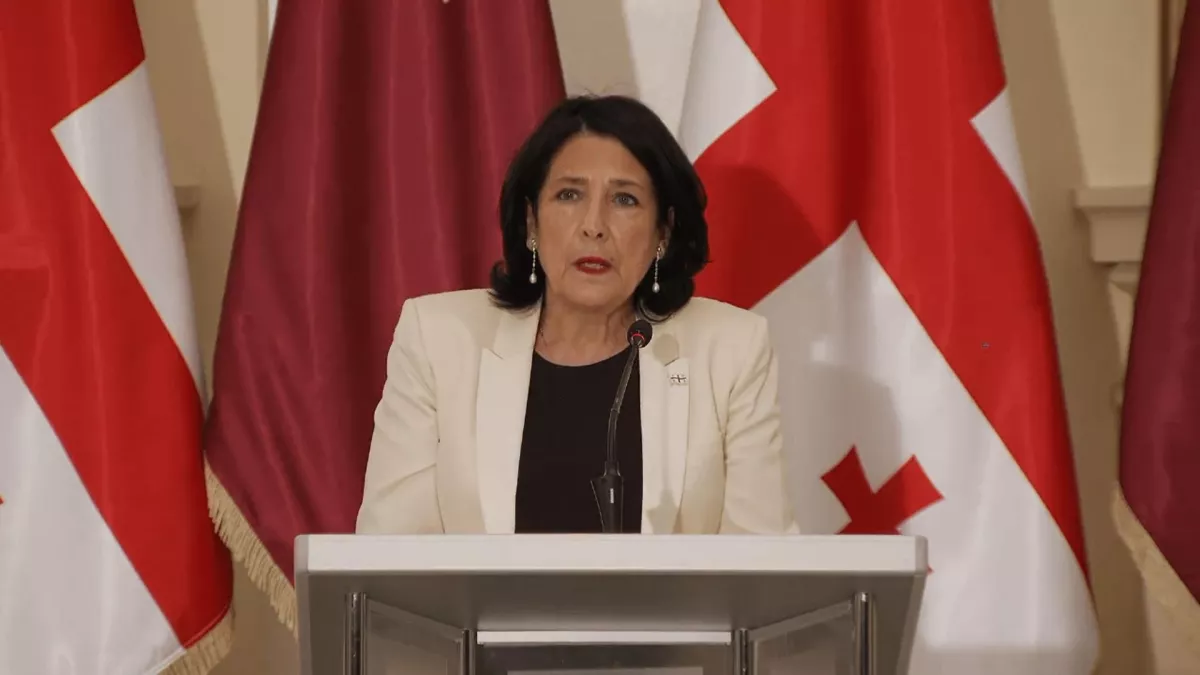Opposition's protests fail to gain momentum in Georgia amid growing support for government
The latest political trends in Georgia show that the victory of the "Georgian Dream" party in the parliamentary elections on October 26, 2024, was entirely well-deserved.
The opposition has become marginalized and lost the support of its supporters much more quickly than those who anticipated a "revolution" had expected. The protests organised by the opposition from November 18 to 20 were aimed at Western sponsors.
Ahead of these protests, opposition leaders sent a letter to EU High Representative for Foreign Affairs and Security Policy Josep Borrell, as well as to the foreign ministers of EU member states, urging them not to recognize the results of the October 26 parliamentary elections in Georgia. However, the opposition's attempts to organise round-the-clock mass rallies in central Tbilisi, using students with tents, quickly failed.

The pro-Western opposition in Georgia likely initially aimed to replicate the success of the Kyiv Maidan protests eleven years ago. In response to the refusal of the then-president of Ukraine, Viktor Yanukovych, to sign the Association Agreement with the EU, a pro-European youth rally was launched in central Kyiv, which was eventually dispersed by the authorities. This is exactly what the pro-European opposition and Western non-governmental organisations (NGOs) were waiting for, as their resources began to report on the "brutal beating of children."
As a result, the "Euromaidan" in central Kyiv became a "permanent" protest, with tents and full support for the demonstrators. This Maidan was fully backed by the EU and the US. Ultimately, the Maidan "camp" became more radicalised, leading to clashes with law enforcement, and by February 2014, the opposition successfully carried out a violent power grab in Kyiv, forcing President Yanukovych to flee. Back in 2013, both in Ukraine and across the post-Soviet space, there were still certain European illusions.
The "European choice" was idealised, and few understood the true cost that would ultimately have to be paid for making that choice. Millions of Ukrainians and Georgians have recently had the opportunity to witness firsthand what the EU truly represents, thanks to the visa-free access to European countries. Many Georgians who have worked in Europe have come to the conclusion that it is better to live and work in their homeland, regardless of its "European prospects."
Many people also witnessed firsthand the problems faced by European countries, as well as the actual living conditions and standards of citizens in countries that joined the EU relatively recently, such as Romania, Bulgaria, and the Baltic states. Most of the Georgian citizens who had visited Europe did not see the so-called "European paradise" that would justify "disrupting" their country with revolutions and "putting it at risk of military conflict." Even the first opposition protest near Tbilisi State University, when highways leading to the Vake district of the capital were blocked on the evening of November 18, caused nothing but frustration for most Tbilisi residents, who were forced to sit in traffic jams for hours due to the rally.
Apart from the relatively small group of students and opposition activists, few people showed up for the protest. The briefing by de facto opposition coordinator, Georgian President Salome Zourabichvili, on the evening of November 18, where she declared falsification of the election results did little to mobilise protesters. Their numbers were no longer in the thousands, as in previous opposition rallies, but in the hundreds.
On the morning of November 19, 2024, the police quickly dispersed the rally and reopened one of the main highways in the capital — Chavchavadze Avenue. Pro-Western media broadcasted footage of the allegedly "brutal crackdown on protests" — however, there was little resistance, apart from a few incidents. Traffic on Chavchavadze Avenue was restored very quickly, much to the relief of most Tbilisi residents who rely on this route to get to work. Thus, the opposition failed to mobilise against the "Georgian Dream" which they claimed had "stolen Georgia's European future" and was allegedly a "Russian puppet."
Even before the opposition protests on November 18, Tbilisi Mayor Kakha Kaladze confidently stated regarding the new parliament's session that the parliament will certainly convene and continue working as usual. The government will be approved. "Nothing and no one will be able to prevent this, despite attempts at destructive actions. With these attempts, they will once again reveal their true face to the people of our country," he added. Moreover, the ruling party made it clear to the people of Georgia that, under the current conditions imposed by Brussels, it is quite possible that Georgia will never join the EU.
When executive secretary of "Georgian Dream" and leader of the parliamentary majority, Mamuka Mdinaradze, was asked at a briefing he organized on November 19 about the European Commission's enlargement report, which calls for the repeal of the anti-LGBT (lesbian, gay, bisexual, transgender) propaganda law and the foreign agent law, he made it clear that Georgia does not need "such European integration if the path to it is based on LGBT propaganda."
The leader of the parliamentary majority also commented on the letter from opposition leaders, in which they urged the EU not to recognize the legitimacy of the 2024 parliamentary elections and the new Georgian parliament. "They are asking the Europeans to somehow punish the people of Georgia and their own homeland... Their espionage has never been confirmed more than by this letter," Mdinaradze stated.

On the evening of November 19, despite Salome Zourabichvili filing a lawsuit with the Constitutional Court of Georgia and demanding that the final election results be declared unconstitutional, the opposition managed to gather an even smaller protest rally near Tbilisi State University than the day before.
The protest was no longer about hundreds, but rather dozens of participants. In the end, when it became clear on the morning of November 20, 2024, that the police would easily handle this rally as well, the opposition leaders themselves decided to call off their very small event. Zurab Japaridze, one of the leaders of the opposition "Coalition for Change," urged the protesters to disperse.
Japaridze promised that "today or tomorrow" they would come up with something "that would surprise the authorities and knock them off balance." Later that evening, municipal services began decorating the streets, where the opposition had attempted to organize their protests, in preparation for the New Year holidays. This year, the opposition is expected to attempt to organise another protest on November 25, the day the new parliament convenes. Although it is already clear that in the coming months the opposition leaders will be unable to create "mass popular outrage" in Tbilisi, dangerous provocations that threaten Georgia's statehood cannot be ruled out.
The danger may come from where it has already emerged several times in recent history – from separatists or separatist regions. It is important to remember that Georgia has two occupied separatist regions and one where separatism is currently "driven underground" – Samtskhe-Javakheti. Today, Georgia finds itself in a unique situation – in Tbilisi, the government has solidified its power with a stance aimed at normalising relations with Russia, while in the separatist regions occupied by Russia, primarily in Abkhazia, the situation is unfolding quite differently from what Moscow had hoped for just recently.
Having suffered a defeat in Tbilisi, the Western-backed "Maidan" in separatist Sukhumi nearly triumphed in the same days. At least, the Kremlin's loyal separatist puppet "president" and "prime minister" have been dismissed, and ratifying the Moscow-friendly "investment" agreement in the separatist "parliament" has so far been unsuccessful.
By the way, despite Russia's efforts, the "foreign agent" law has not been adopted in separatist Abkhazia, which has allowed Western-funded NGOs to operate freely there. It is no coincidence that the Sukhumi Maidan has been supported by incumbent "French president of Georgia" Salome Zourabichvili and imprisoned ex-president Mikheil Saakashvili.
"In occupied Abkhazia, there is an attempt to implement Russian legislation, which is being resisted by civil society. I want to express my solidarity with them," said Zourabichvili, and her words were immediately published by Russian media. In the end, leader of the Abkhazian opposition, Adgur Ardzinba, had to "visibly respond" to Zourabichvili. "The Abkhaz opposition is engaged in internal political struggle solely in the interests of the multiethnic people of Abkhazia." "As for whose interests Zourabichvili represents, we don't know, and frankly, we are not very interested. We have a lot of work ahead of us to restore order on our land, and the solidarity of any political figures from across the Inguri River is certainly not required for that," stated Ardzinba. Ultimately, the most dangerous provocations for Georgia may arise in connection with the beginning of efforts to eliminate the consequences of separatism.
This is especially true when the process of reintegrating Abkhazia and the Tskhinvali region, as well as the return of refugees, begins in one form or another. At the beginning of such a process, it seems that rational politicians in Moscow are just as interested as those in Tbilisi. Although this is not openly discussed in Russia yet, work on "shaping public opinion" regarding Abkhazia is already in full swing. The NGOs in Abkhazia, supported and funded by the West and EU, do not even hide their intention to shed Georgian blood if they begin to return to Abkhazia.
What is most surprising is that many so-called "anti-Western" Russian ultra-patriots share their solidarity, not to mention the ethnic Armenians in Abkhazia who are unwilling to hear about the return of Abkhazia to Georgia. The hostility of Georgia's pro-Western opposition towards the "Georgian Dream" party, which aims to peacefully restore the country's territorial integrity, its "solidarity" with the Sukhumi "Maidan" and its intention to stage similar "Maidans" across the rest territory of Georgia, creates a volatile mix. It could be artificially ignited at any moment and in any place where Georgians and Abkhaz, Georgians and Ossetians, or Georgians and Russians "come into contact" or are likely to do so.
Georgian analyst Vladimir Tskhvediani, specially for Caliber.Az








